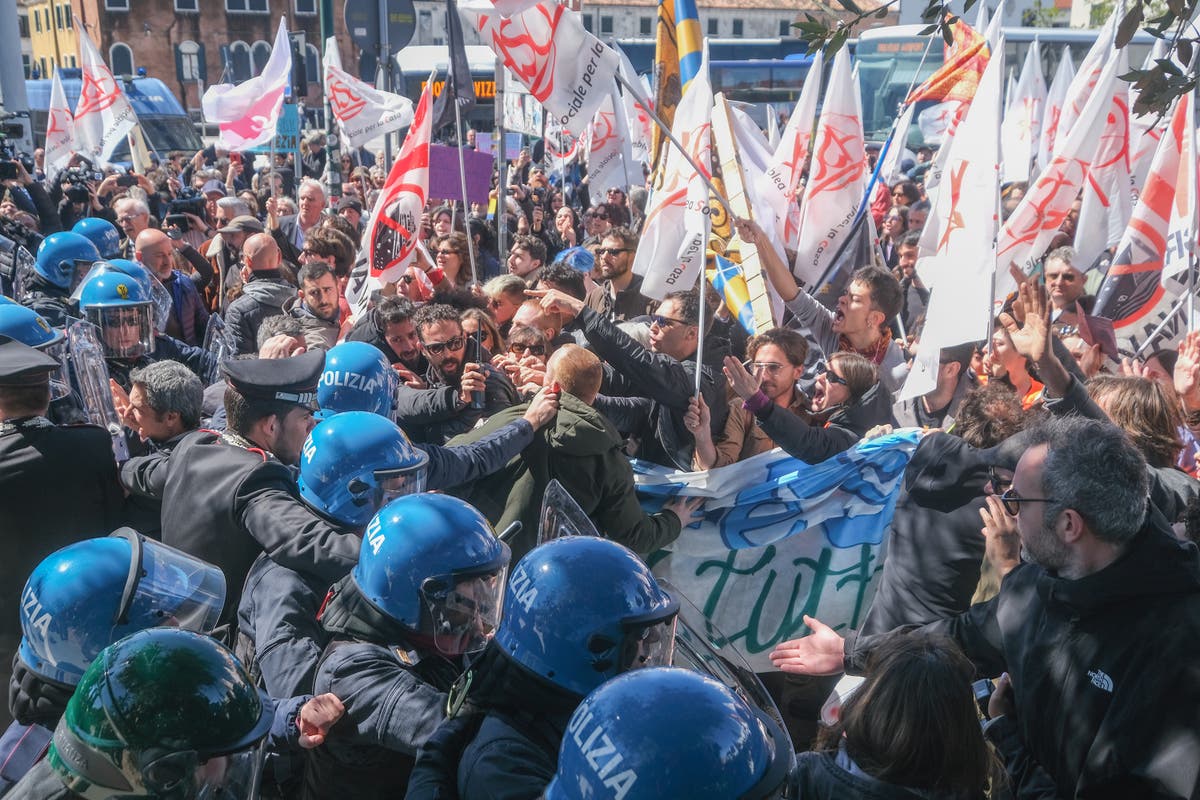Venice protesters clash with police after city introduces tourist tax: ‘We don’t live in a theme park’
Locals chanted ‘here we live and here we stay’ as a few hundred people marched through one of Venice‘s main squares


Sign up to Simon Calder’s free travel email for expert advice and money-saving discounts
Get Simon Calder’s Travel email
Protesters have clashed with police in Venice on the day it became the first city in the world to introduce a payment system for tourists.
The move came into force on Thursday in an effort to thin the crowds that throng its canals.
It has been met with protests from residents saying they didn’t want to live in a theme park. Some confronted police officers during a demonstration in Piazzale Roma.
Signs were set up outside the train station and near an entry footbridge warning visitors they had to pay the new five-euro charge before diving into Venice‘s famous alleyways.
Simone Venturini, the city councillor responsible for tourism and social cohesion, said the scheme would help Venice find “a new balance” between residents and day-trippers, but hundreds of local protesters saw things differently.
“We are against this measure because it will do nothing to stop overtourism,” said resident Cristina Romieri. “Moreover, it is such a complex regulation with so many exceptions that it will also be difficult to enforce it.”
Giovanni Andrea Martini, a member of an opposition group in the Town Hall who joined the residents’ protests, called it “a sad day because Venice is becoming a museum, a theme park.”
Holding banners reading “No to ticket for Vene-Land” and chanting “Here we live and here we stay”, a few hundred people marched through one of Venice‘s main squares to express their opposition to the new measure.
April 25 is a national holiday in Italy and is the first of 29 days this year when people must buy a ticket if they want to access the lagoon city from 8.30 a.m. to 4.30 p.m.
Reservations are meant to be made online but there is also a booth on hand for those who don’t have smartphones.
Although there are no turnstiles at the city gateways, inspectors will be making random checks and issuing fines of between 50 and 300 euros to anyone who has failed to register.
HOW DOES THE VENICE SYSTEM WORK?
Simon Calder explains:
Any visitor who wishes to be in the historic heart of Venice – anywhere in the city apart from the Piazzale Roma transport access area and the offshore islands – between 8.30am and 4pm on the prescribed dates must register online, in advance, at cda.ve.it/en.
You will need a QR code on your smartphone or printed out to be allowed inside the ancient city.
If you simply want to pay the fee, clicking on “Pay the access fee” will take you through a fairly straightforward process. One tricky aspect is that you have to pretend you have read the privacy policy (all in Italian) by clicking on it, before you can enable a checkbox.
Italian tourists arriving on Thursday said imposing another charge on visitors was unfair.
“I consider Venice to be the most beautiful city in the world and so to deprive a person on a low budget of the opportunity to come here for an hour or two to enjoy this city is surely a shame for these tourists,” said Gabriella Pappada, who came from Lecce in southern Italy.
The initiative is one of a series of measures in place across Italy to manage tourist flows.
Florence announced in October it was banning new short-term residential lets on platforms such as Airbnb in its historic centre. It also offered three years of tax breaks to landlords of short-term holiday lets if they start offering ordinary leases for residents.
Some 20 million people visited Venice last year, a city official said, with roughly half of them staying overnight in hotels or holiday lets - an influx which dwarfs the resident population currently put at around 49,000.
People with hotel reservations and visitors aged under 14 do not need to pay the entry fee, but still need to register beforehand. Residents, students and workers are exempt.
Venice narrowly escaped being placed on UNESCO’s “World Heritage in Danger” list last year partly because the U.N. body decided the city was addressing concerns that its delicate ecosystem risked being overwhelmed by mass tourism.
Besides introducing the entry charge, the city has also banned large cruise ships from sailing into the Venetian lagoon and has announced new limits on the size of tourist groups.
Other cities, such as Como, have said they are considering introducing a similar measure, but are waiting to see how the Venice initiative works before deciding.

 Kass
Kass 































